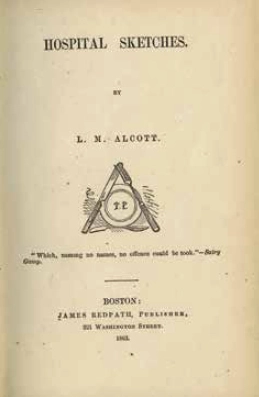She recalled, “As I wrote Little Women with one arm in a sling, my head tied up & one foot in misery perhaps pain has a good effect upon my works.”61 Though scholars disagree as to the precise agent of Alcott’s death, it is at least probable that her demise was hastened by the recurring effects of the mercury forever trapped in her system. If so, then the causes of her passing were set in motion before she published any of the books for which she is now remembered, and she died a lingering casualty of the Civil War.
Nevertheless, Alcott’s service in the war had a richly redemptive side. At least until the long-term effects of her poisoning became evident, she greeted her new lease on life with refreshed optimism, feeling “as if born again[;] everything seemed so beautiful and new.”62 Her ordeal also transformed forever her relationship with her father. Both Bronson and Abba saw their daughter’s recovery as akin to a miracle. Like Lizzie before her, Louisa had passed through the valley, but she had returned. Bronson found an additional reason to reassess his erstwhile black sheep. For decades, he had valued nothing more than self-sacrifice. Now Louisa had very nearly given her all for the holy causes of emancipation and union. Bronson never forgot Louisa’s selfless courage, and never again, it seems, did he write a critical word about her. Almost twenty years after Louisa’s military service, Bronson wrote a sonnet praising her courage. He ended it with the line, “I press thee to my heart, as Duty’s faithful child.”63
Alcott’s work in the hospital brought her one still more crucial benefit. Before she went off to war, her stories tended to indulge in the kind of grotesque fantasy that often points to a lack of experience in the world. She had yet to learn a fundamental precept of fiction: write what you know. Now her flights of imagination had a much-needed ballast: a strong, sad knowledge of the way things were. Alcott immediately put this new understanding to use, crafting her memories of war into a slightly fictionalized account that she called Hospital Sketches. The book was Alcott’s first successful publication on a grander scale than a magazine story. More importantly, she observed, writing it “showed me my style, & taking the hint I went where glory [a]waited me.”64

In 1863, Alcott rewrote the letters she had sent home from Georgetown into a slightly fictionalized memoir she called Hospital Sketches. Alcott observed that writing the book “showed me my style, & taking the hint I went where glory awaited me.” (Louisa May Alcott Memorial Association)
In truth, Alcott still had some ground to travel—and a few slightly wrong turns to make—before real literary glory would be hers. One of these faltering but significant steps was her first published novel for adults. Appearing in 1864 and simply titled Moods, the novel used as its philosophical foundation a quotation from Alcott’s friend and mentor Emerson, who had observed in his essay “Experience,” “Life is a train of moods like a string of beads, and, as we pass through them, they prove to be many-colored lenses which paint the world their own hue, and each shows only what lies in its focus.”65 The novel’s heroine, Sylvia Yule, is moody indeed. She is “always in extremes,” and her brother remarks that she is “either overflowing with unnatural spirits or melancholy enough to break one’s heart.”66 In one chapter, Sylvia lies helplessly in bed, “tired of everybody and everything.”67 A few chapters later, she impulsively rushes toward a wildfire and is nearly burned alive. Later in the narrative, she gives thanks that she has had no child, to whom she might have passed along her “mental ills.”68 Alcott identified more powerfully with Sylvia than any of her other fictional heroines, Jo March included. This was perhaps so because she shared Sylvia’s volatile, mercurial soul. As her alter ego Jo March was to do in Little Women, Alcott followed an erratic creative pattern in her writing. She would become “quite possessed” by her work, sometimes writing for days on end and finding herself so full of restless energy that she “could not stop to get up.”69 Then, her energy spent, she would collapse in exhaustion. In both Little Women and her journal, she referred to these bursts of almost frantic creativity as her “vortices”—periods of intense, whirlpool-like turbulence from which she extracted her imaginative wonders. For Alcott, a vortex could be both exhilarating and frightening; she sometimes feared that falling into one would cause her to break down.70 Add to this the clear presence of bipolar behavior on her father’s side of the family, and it becomes less than fanciful to suppose that Alcott was prey to some mood disorder of her own.
Alcott writes in Little Women of Jo’s struggle to remain true to her personal vision while pleasing to every possible audience, and of her subsequent discovery that a book that strives to please everyone is likely to please no one. Though Moods was hardly the literary disaster that Jo’s novel appears to have been, Alcott’s experience with her debut novel plainly supplied the basis for Jo’s rueful literary baptism. Alcott’s publisher, A. K.
1 comment